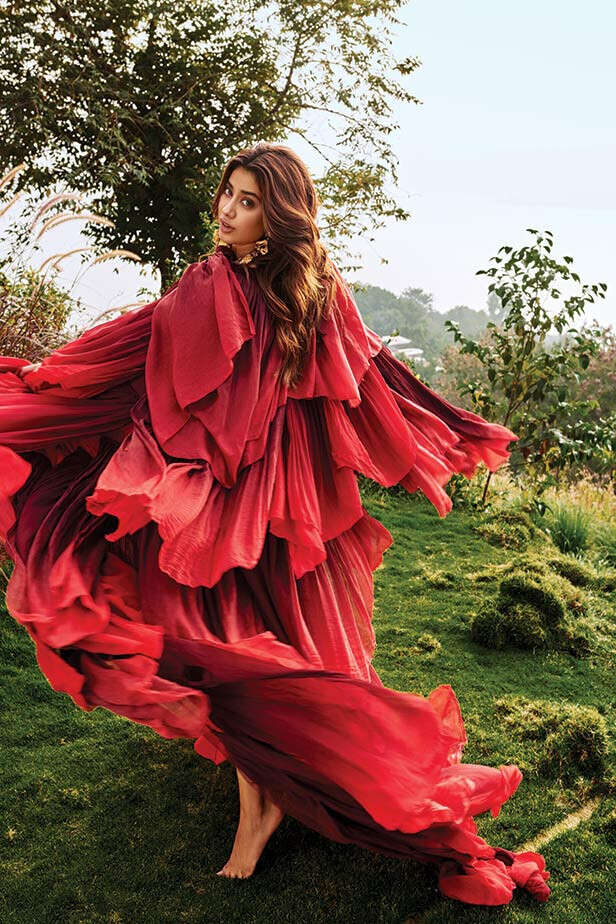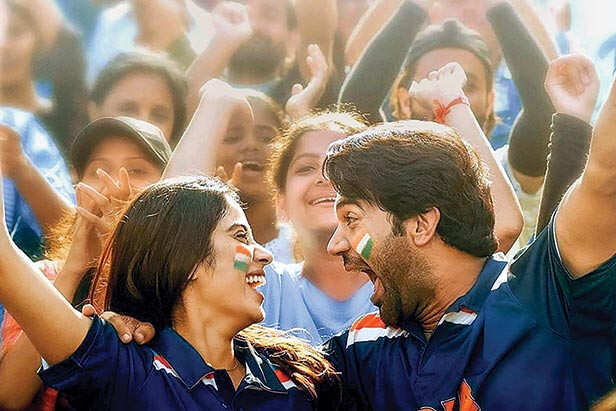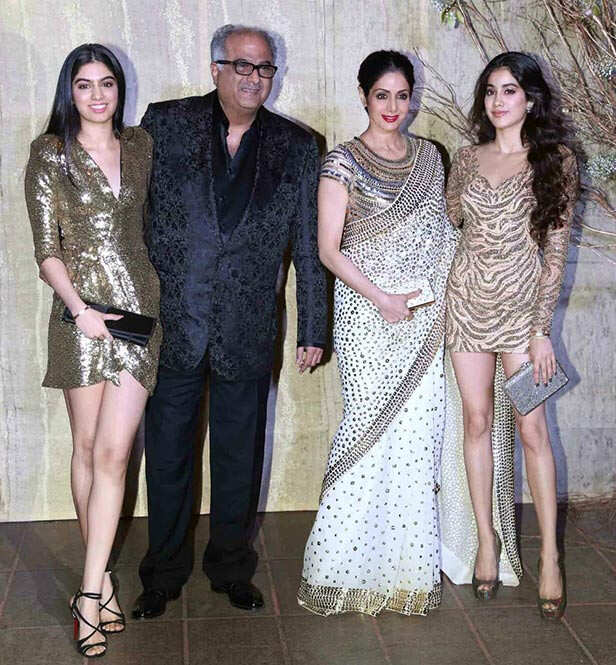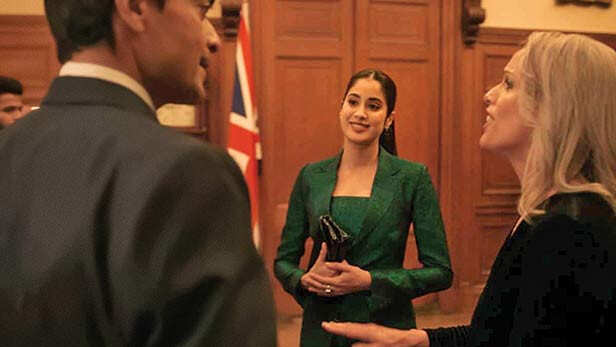EXCLUSIVE: Janhvi Kapoor on Ulajh, being a producer’s daughter, and more

EXCLUSIVE: Janhvi Kapoor on Ulajh, being a producer’s daughter, and more
[ad_1]

We know Ulajh means entanglement. In real life, are you the kind of person jo kisi se bhi ulajh jaayegi? Or are you a non-confrontational person?
I’m usually non-confrontational. But it also depends on my mood. If someone decides to take up an Ulajh with me on the wrong day, then I’ll take on anyone.
Are there any aspects of your role in Ulajh that you could identify with? Are there any parallels to your real self?
Suhana, as an IFS officer, as a diplomat, as primarily a woman in a man’s world. She combats male egos a lot. And at every juncture, she has to do her job without hurting anyone’s ego. She must do so without disappointing anyone. These aspects are important when you’re dealing with situations like national security and how your country is represented. So, for a character like Suhana, she has to be cognizant of managing people’s egos much before her own self-respect. I guess that is something that I’ve done in life, too. Another aspect is that of perception. Suhana has to be wary of her perception and her country’s perception. She has a legacy to look after, and she’s living up to the pressure. I guess I have dealt with all of these things in my life, too.
When you talk about navigating male egos, is that similar to how a female artiste has to go through the film industry?
I don’t think navigating egos is just an actor thing. I think it is a female thing. I don’t think you, as a man, have thought about it. I hope I don’t make this girl feel bad with my actions. I know that as a man and a good person, you’re aware that you don’t want that to happen, right? I don’t want to make anyone feel bad, either. But I don’t think you’ve ever had to be cognizant of the fact that if I hurt her ego, there will be repercussions. During the course of my readings for this film, as I was going through the script and the scenes, I realised how much of an everyday challenge this is for women. When you’re in a room full of powerful men and you have something to say that you know, objectively, makes more sense than anything anyone else is saying, you have to be mindful of how you put it across without seeming like a dedh shaani. Do you understand that?

Yes. So, is it difficult to be opinionated or articulate when you’re a commercial film actress?There have been so many times where you need to put your opinion across without seeming like you’re too opinionated, without seeming like you’re trying to overstep. These are things that every woman in a workspace has had to deal with. It was something that I was dealing with without even being aware of it. Even to have that confidence, ke shayad jo mai bol rahi ho woh sahi hai. It’s not easy. I’ve learned all of these things through the course of shooting this film.Popular physicist Neil deGrasse Tyson says if you ever find yourself in a room where you’re the most influential or the most intelligent, find a new room.Yes, the sentiment is that you’re in the wrong room. Get out of that room immediately. But honestly, I think this statement is sometimes misconstrued. Sometimes people think of it as surrounding yourself with people who have more than you so you can aspire for more. Maybe that’s a very small aspect of it. What he means is that you need to surround yourself with people you can learn from and grow from. If in a room, you’re the only one who has opinions, who is curious, and everyone else is kind of stagnating in life. Then that room or crowd doesn’t have much to offer you intellectually.

Which individuals have contributed to your personal growth?
My parents have contributed to my personal growth. They’ve basically brought me up; they’ve conditioned me. Many of my teachers in school have done that too. I had a teacher called Peter Clinton, who was my TOK (theory of knowledge) teacher. It was a subject that I think only IB schools had, where you discuss the human psyche, philosophy, and things like that. I loved that subject, and I loved the way he taught that class. There was one teacher who hated me as well. He was Mr. Bruce Lewis, but I loved him, and I loved his classes. He was a literature teacher, and he really made me fall in love with literature, writing, and reading. Even Pandit Birju Maharaj had an impact on me. I got to spend time with him only briefly, but just to be in the room with him and his years of experience, his art, and his greatness was enriching. Every time I was around him, I knew I was in the presence of someone special, almost godly, someone who transcends even the greatness of their art.You’ve often credited your directors for having a positive influence on you.Shashank Khaitan and Nitesh Tiwari sir have had a big influence on me in the way that I approach my craft. Neeraj Ghaywan sir has had a huge influence on my thinking and understanding. We started interacting during the lockdown, and he really opened my eyes to a lot of things, like caste and creed in society.

Have you ever had a hard taskmaster whip you into shape?People around me have told me to whip myself a little less. My friends and colleagues keep telling me you should chill.
Are you often hard on yourself?Yes.
Why?
I don’t know. t’s just my predisposition, I guess.
Do you think you got it from your mom or your dad? Or is it self-inculcated?
I think maybe I got it from my mom.
There’s a reference to nepotism in the Ulajh trailer. Have you re-ignited the ‘nepo kid’ arguments all
over again?
No, it’s a part of my character’s situation. It is her truth, like it is mine. And I think that this whole narrative and this whole word have become so popular in society and pop culture that people resonate with them and use them often. There’s also a flip side to that. Before others can say anything about nepotism, humne khud hi bol diya.
Being a producer’s daughter, have you been sensitised to the fact that you should be a more frugal actor or star? Is the pomp and show an inevitable part of stardom?
I’m very aware of the pressures that producers face. I know how an actor’s behaviour can make a producer’s life easier or infinitely more difficult. And I always try to make it easier. If a producer has ever asked me to skip on a vanity van or not travel with my entire team on a certain day because of whatever condition, I’ve done that. I think as actors, ultimately what you care about is making the best possible film and alleviating as much of the pressure as you possibly can. But in other situations, if you ask me for my wish list, of course, I’ll want my team. I want all of us to be comfortable, but never at the cost of the movie.
Has your father ever tried to coach you as a producer?
No, unka oolta chalta hai. Woh kitni baar bolte hain ki, why are you not taking Viji with you? Viji is like my sister. She’s been working with us for years. Papa will ask, Why is your manager not travelling with you? Why is Viji not going with you? She needs to be there for you when you come home from shooting. Now I’ve started taking Viji everywhere with me. But, because I realised I really do need her, Initially, I was convinced that I wanted to travel by myself. There have been times when I have told my producer that if we’re changing ticket bookings, I will pay for them. But Papa has insisted they need to look after these expenses.

Actors often have a very symbiotic relationship with sets. At times, you’re only as good as your co-star. So on a film set, are you a giver or a receiver?I am whatever the person wants me to be, I guess.
What about actual relationships in real life? Is that giver/receiver role clearer in a family or romantic relationship?No, it’s always a give-and-take relationship. It can ever be lopsided. You can never function where I’ll only be the provider, the nurturer, and the caretaker, and the other person will just keep taking all that energy and affection. It doesn’t work like that.
Looking back at your fashion choices over the years, is there a particular phase or look that you’re especially fond of? Or, on the contrary, is there anything that you now look back at and cringe at?I definitely cringe at my post-Dhadak phase. I think two or three years after my first film came out, I was very lost, even in terms of my fashion and self-expression. I was just trying to be someone I wasn’t, and I wasn’t comfortable in my body.
We’ve seen your method of dressing, especially during and after Mr. And Mrs. Mahi’s promotions. Does that come out of your love for fashion? Or is it to sort of rule the social media trends and headlines?It comes from my love for fashion. I’m genuinely excited by it. To be very honest, I did it for fun during Mahi’s promotions. There’s always been a good amount of attention paid to how I dress, and I wanted to bring that attention back to the movie, so I really used it as a ploy. And it worked out well. I might repeat it, and hopefully it’ll have the same effect on my future films. But I’ll only do it as long as I have fun with it.
[ad_2]




